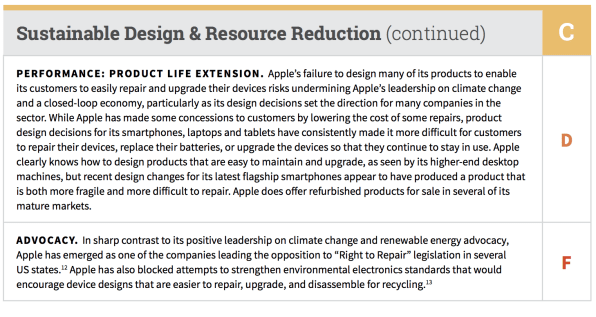Apple is out with its 2018 Environmental Responsibility Report today, and in it is news of a new iPhone disassembly robot named Daisy that can rip apart 200 iPhones in an hour to get to the reusable and recyclable parts. (Daisy is an upgraded version of Apple’s first such robot, 2016’s Liam.)
Greenpeace quickly released a statement saying, in effect, that Apple should focus its green energies on making iPhones more repairable in the first place, so that they last longer and don’t show up in landfills quite so soon. Greenpeace senior analyst Gary Cook wrote:
“Rather than another recycling robot, what is most needed from Apple is an indication that the company is embracing one of its greatest opportunities to reduce its environmental impact: repairable and upgradeable product design. This would keep its devices in use far longer, delaying the day when they’d need to be disassembled by Daisy.
Cook cited the three- to four-week wait times for iPhone battery replacements at Apple retail stores earlier this year as proof that customers want to repair rather than replace their iThings.
Apple had no comment.
This isn’t the first time Greenpeace has criticized Apple on the repairability issue. It also did so in its 2017 review of the tech company’s green credentials: Apple got a B- overall, an a C in the Sustainable Design & Resource Reduction section. (Apple was still ahead of HP, Dell, Microsoft, Amazon, Google, and every other company tested, except for the “sustainable” device company Fairphone, which received a B overall.)

Greenpeace teamed up with iFixit last summer to create a report rating the repairability of phones, in which it nailed Apple for the lack of available replacement parts (including batteries) for iPads and iPhones, and the need for special tools to do repairs, among other things.
The right-to-repair advocacy group Repair.org says bills guaranteeing consumers the right to repair their technology have been introduced in 22 states. California is the latest state to introduce a Right to Repair Act. Apple has actively opposed such legislation in state houses across the country.
Meanwhile, the company continues to seek to burnish its environmental credentials in other ways. Apple recently announced that, through its energy projects and power acquisition agreements, the amount of “green” energy it is putting on the grid now exceeds the amount of “brown,” or fossil fuel, energy it uses.
(34)